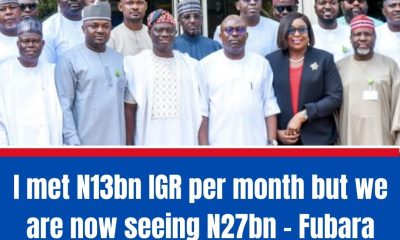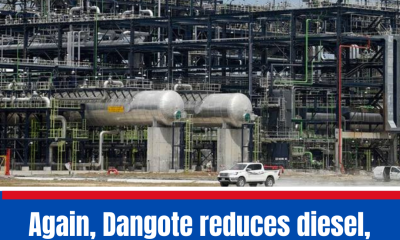Politics
Insecurity, inadequate infrastructure, stalling Nigeria’s mining sector growth-Kalu

Deputy Speaker of the House of Representatives, Rep Benjamin Okezie Kalu, has stated that insecurity, inadequate infrastructure and lack of skilled labour have continued to act as bottlenecks, hampering growth, of the Nigeria’s mining sector.
Kalu made the assertion while delivering his address at a Public Policy Dialogue on Nigeria’s Minerals and Mining Legislation in Abuja on Monday.
He said the nation’s vast mineral resources have remained largely untapped, and undeservedly, overshadowed by our too much reliance on oil.
Kalu, also said, despite boasting over 40 commercially viable minerals, the mining sector contributes a mere 0.3% to the country’s GDP, saying it is unacceptable.
Making reference to a Bill he co-sponsored with the Chairman, House of Representatives Committee on Solid Mineral, Rep Jonathan Gbefwi titled: ‘Nigerian Minerals and Mining Act (Amendment) Bill’ and eight other mining bills, Kalu said the bills when passed into law, will represent a turning point for the nation’s mineral wealth.
The Deputy Speaker also noted that Governments, hold many of the levers to deal with the great challenges, adding that, “businesses have the innovation, technology, and talents to deliver needed solutions.”
READ ALSO: Presidency Speaks On Why FG Won’t Be Able To Pay N100,000 Minimum Wage
The Deputy Speaker opined that the governing philosophy in the mining sector in Nigeria should henceforth, be approached with a private-sector-led lens, stressing that it is through this crucial partnership that the true potential of Nigeria’s mining sector can be unlocked.
“This public policy dialogue is engineered to create appropriate right of way for the necessary adjustments and policymaking creativity, required to optimize the promising prospects of Nigeria’s mining sector.
“Today, I stand before you not only as Deputy Speaker of the House of Representatives but also, as a co-sponsor of the HB.751: Nigerian Minerals and Mining Act, (Amendment) Bill, ably sponsored by Rep Jonathan Gbefwi.
“This legislation, if passed, will represent a turning point for our nation’s mineral wealth.
“There are indications of a renewed vigour in our mining industry, fueled by a collective will to diversify our economy, create jobs, and unlock the immense potential that lies beneath our soil.
“The 2016-2025 Mining Industry development roadmap, aiming to increase the sector’s GDP contribution to three per cent by 2025, is already showing progress.
“Projects like the Segilola Gold Project in Osun State governed by a private-sector-led lens are injecting millions of dollars into our economy and attracting much-needed investment.
“To demonstrate this concisely, in the 3rd quarter of 2023, the Segilola Gold mine in Osun State, Nigeria’s first industrial-scale gold mine posted $118 million in revenue for its owners.
“The Explorations Limited after reporting $71.7 million in earnings before interest, taxes, depreciation, and amortization (EBITDA) in 2022, according to its publicly available financial statements for 2022 and 2023.
“Initiatives like the simplification of licensing and competitive royalty regimes attract global players like ‘Thor Explorations’, showcasing the potential for an industrial-scale mining sector.
“However, the challenges remains, Insecurity, inadequate infrastructure, and a lack of skilled labor continue to act as bottlenecks. This is where the HB.751 and eight other mining-related bills currently, under consideration come in.
“They are not just amendments; they are a comprehensive reform package designed to address these challenges and propel our mining sector into the future.
“By fostering collaboration between mining companies, communities, and security agencies, we can create a safer environment for investment and development.
“We are committed to investing in critical infrastructure like roads, railways, and power, making mine operations more efficient and cost-effective.”
Kalu revealed that the 10th House is building partnerships with educational institutions and industry leaders to equip Nigerians with the skills they need to thrive in this sector.
“The new legislation will simplify bureaucratic processes, reduce red tape, and create a more transparent and predictable regulatory environment.
“I urge all stakeholders Government, businesses, communities, and civil society, to join hands and work together to make this vision a reality. Let us leverage the power of partnerships, innovation, and technology to unlock the true potential of our mineral wealth”.
-

 Business7 days ago
Business7 days agoI met N13bn IGR per month but we are now seeing N27bn – Fubara
-

 News6 days ago
News6 days agoCourt orders Becky Buodeigha alias Becky Minaj, CEO of BM Secrets to pay Baraza N7m
-

 Politics5 days ago
Politics5 days agoEFCC: I am Ready to Appear in Court But Afraid of Arrest – Yahaya Bello
-

 News1 day ago
News1 day agoYahaya Bello: American International School Of Abuja Has Transferred $760,910.84 To EFCC Out Of $845,852
-

 Politics5 days ago
Politics5 days agoCourt dismisses suit seeking Diri’s disqualification, awards N500,000 Fine
-

 Politics7 days ago
Politics7 days agoEFCC Goes After Malami, Sirika, Farouq-umar Over Multi Fraud
-

 Business5 days ago
Business5 days agoAgain, Dangote reduces diesel, aviation fuel prices to N940, N980
-

 Sports6 days ago
Sports6 days agoSamson Siasia Reveals How Poorly NFF Treats Nigerian Coaches




